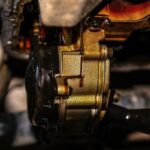
28 Jul Your Car’s Oil Pump: Learn The 6 Signs That Is Failing
 If you drive an internal combustion-powered vehicle, there is a hidden part that acts as the cornerstone of the whole operation. It may not seem like much, I mean, it’s a relatively simple design and only performs one function. But if it fails, it can cause catastrophic damage to your car’s engine. What is this wondrous component, you may ask? The oil pump. Yup, the oil pump moves engine oil to all the internal engine parts and prevents low oil pressure, which can cause an overheating engine.
If you drive an internal combustion-powered vehicle, there is a hidden part that acts as the cornerstone of the whole operation. It may not seem like much, I mean, it’s a relatively simple design and only performs one function. But if it fails, it can cause catastrophic damage to your car’s engine. What is this wondrous component, you may ask? The oil pump. Yup, the oil pump moves engine oil to all the internal engine parts and prevents low oil pressure, which can cause an overheating engine.
What Does An Oil Pump Do?
An oil pump pressurizes oil and moves it through various moving parts in a combustion engine. As you know, engine oil provides lubrication, reduces friction and wear, while absorbing excess heat. An oil pump running optimally with adequate oil levels helps prolong the life of your engine’s components. With routine maintenance, oil pumps typically last the lifetime of your car.
Where Is The Oil Pump?
Most modern automotive engines install the oil pump in the oil reservoir under the crankshaft. The pump gets engine oil via the oil filter, which strains out particles that could damage the pump. It then pumps pressurized oil in a never-ending cycle while your vehicle is running.
Which Oil Pump Do I Have?
There are two main types of automotive oil pumps: gear pumps and vane pumps. The engine’s crankshaft or camshaft drives both types.
Gear Pumps
Gear pumps use two gears that mesh together to create suction and pump the oil. The gears rotate, trapping oil between them and then pushing it through the pump’s outlet. Older, mechanical engines typically use these pumps.
Vane Pumps
Vane pumps use a rotor with sliding vanes to pump the oil. As the rotor spins, the vanes create suction that pulls oil into the pump. The vanes then move outward, compressing and pushing the oil through the pump’s outlet. Newer, electronic engines typically use vane pumps.
6 Common Warning Signs
A failing oil pump will starve the engine of oil and can result in devastating engine damage. Several warning signs will alert a savvy motorist to a potential mechanical problem. I have compiled several of them below.
1. Burning Smell
Burning oil often indicates an issue with the oil pump, which can result in poor engine performance and increased emissions. Blue smoke may accompany the burning smell, which is a sure tip-off that your car is literally burning oil. Schedule a diagnostic inspection to determine the source of the burning oil.
2. Dashboard Warning Lights
If your vehicle doesn’t have an oil pressure gauge, it may have an ‘oil pressure’ dashboard warning light. It usually looks like a red oil can with a droplet. Some vehicles may also show an ‘oil level’ warning light, which may be yellow with the word ‘min’ to indicate a low oil level. Depending on the severity of your issue, your ‘check engine’ light may also illuminate, but this is usually not due to low oil. The ‘check engine‘ light will trigger from high engine temperatures, a bad oxygen sensor, or a loose gas cap (among other causes).
3. Low Oil Pressure
The oil pump pressurizes your vehicle’s oil system, so if it malfunctions, the oil pressure will drop. The pressure sensor near the oil pump’s outlet should activate your dashboard warning lights if the pressure drops below a safe threshold.
4. Overheating Engine
When your vehicle’s oil pump doesn’t move enough engine oil to the components that need it, the temperature gauge for your engine will rise. Inadequate oil levels result in more friction, which produces more heat and wear. In these circumstances, your vehicle will overheat quickly. Driving a car with an overheating engine can result in extensive engine damage requiring very expensive repairs and part replacements.
5. Unusual Noises
A failing oil pump may make noises you don’t normally hear from your engine. Additionally, when the other engine components run dry, you may notice sounds from different areas under the hood. Schedule a diagnostic appointment immediately if your car makes any of the following sounds:
- Grinding
- Knocking
- Ticking
- Whining
- Whirring
6. Vehicle Won’t Start
Many newer model vehicles have a low oil pressure switch that’s tied directly to your vehicle’s ignition. If this switch detects that your oil pump isn’t working correctly, it might keep your engine from starting. Older model cars don’t have this nifty feature, so it’s up to you to notice the warning signs to prevent engine damage.
What Causes Oil Pump Failure?
Oil pumps last a really long time. When they fail, it’s usually for reasons related to age, wear and tear, and poor maintenance. Here are a few examples to keep in mind:
- Chronic Overheating Engine
- Dirty or Contaminated Oil
- Excessive Mileage (150,000+)
- Low Engine Oil Levels
- Poor Maintenance Habits
- Using Incorrect Oil Viscosity
- Vehicle Age
Can I Do Anything To Protect My Oil Pump?
Absolutely. As a car owner, it’s your responsibility to perform routine maintenance. It’s important to inspect your oil levels monthly and fix any leaks promptly. Newer vehicles have electric sensors and computer systems that seem to eliminate the guesswork. However, it’s not wise to rely solely on these electronics without manually verifying your oil levels. Following the factory-recommended oil change intervals and milestone service inspections can help maintain your vehicle’s performance and longevity.
Auto Service & Repairs in Plymouth Meeting, PA
Plymouth Auto & Tire Center has over 40 years of ASE-certified experience on our technical team. We provide honest and professional diagnostic inspections with detailed repair options to fit your schedule and budget. Our skilled technicians will gladly discuss your oil pump concerns and perform low oil pressure testing to accurately determine the cause of your overheating engine. We can also replace the engine oil and oil filter, and discuss the optimal oil change interval for your specific needs.
Make An Appointment
Call us at (610) 825-6558 or visit us online to make your next service appointment.
We offer competitive pricing on parts and labor, as well as monthly service specials.

